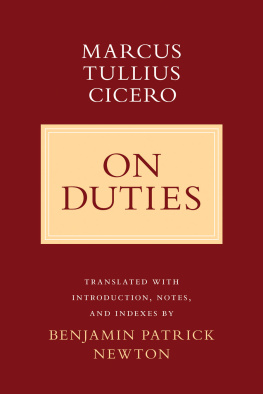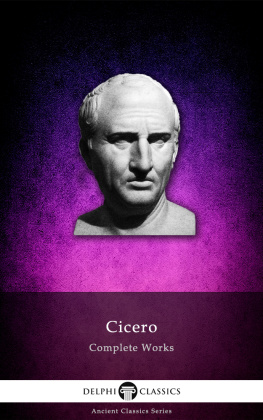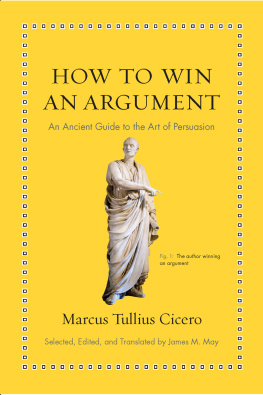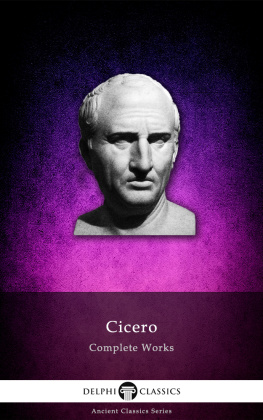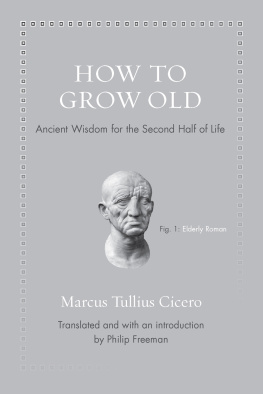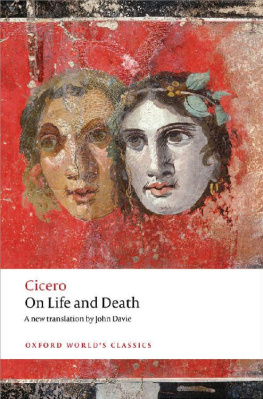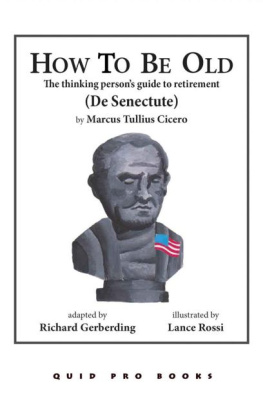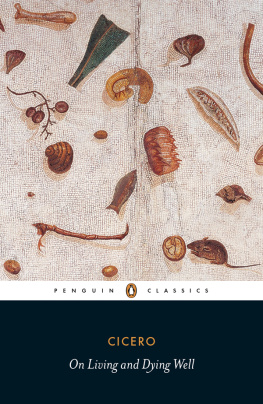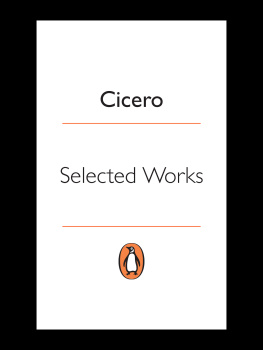For my M. B.
Acknowledgments
It is only appropriate in a book on officia to acknowledge those who acted so amiably as teachers, colleagues, and loved ones. These men and women are the very best of individuals, those who go about their business and lives not simply out of a sense of utility but because virtue is worth pursuing for its own sake. Never fashionable, never fair-weather, always constant, always thoughtful, these are individuals whom I am honored to have worked with and known. My sincere appreciation to Charles L. Babcock and Charles E. Butterworth, who guided my studies of Latin and philosophy, respectively; to David S. Fott and Thomas L. Pangle, who very kindly offered their advice and an editors eye throughout the writing process, as well as to James F. Pasley, who extended every courtesy while I finished the book; and to my parents, James and Roxann Newton, and my wife, Summer D. Newton, who provided patience, love, and a spousal sabbatical. Many thanks also to Roger M. Haydon, Karen T. Hwa, Susan C. Barnett, and the anonymous reviewers of Cornell University Press, as well as to Marian H. Rogers of BiblioGenesis, for all of their aid and encouragement. I must also acknowledge my debt to Leo Strauss, whose 1959 course transcript on Cicero provided many hours of pleasure and much food for thought. Without these people, this book could not have been written.
Introduction
You hold in your hands one of the most famous books ever written by one of the most famous men who ever lived. Marcus Tullius Cicero was a preeminent Roman statesman, orator, and philosopher. He was a champion of republican government, who successfully defended the Roman commonwealth against its overthrow by Lucius Sergius Catilina; a powerful speaker, who transformed Latin into the language of learning for sixteen centuries to come; and a prudent man, who introduced philosophy into Rome, and through Rome, into Christendom and the modern world. De officiis , or On Duties , has been considered a source of moral authority throughout classical, medieval, and modern times. It was championed by thinkers of no less importance than Thomas Aquinas, Montesquieu, and Voltaire; it was of decisive influence on Hugo Grotius and his On the Law of War and Peace ; and it was one of the earliest books printed on the Gutenberg press. But the true significance of On Duties lies in its examination of several fundamental problems of political philosophy, the most important being the possible conflict between the honorable ( honestum ) and the useful ( utile ). The honorable encompasses the virtues of human beings, which include justice and concern for the common good. The useful encompasses the needs of living beings, which include certain necessities and concern for private good. Only by understanding the possible conflict between these two sides of human nature may we understand our duties to our community and to ourselves. Throughout On Duties , Cicero continually poses the question, Is there a conflict between the honorable and the useful? Is there ever a time when necessity overcomes justice, or when private good conflicts with public good?
This new edition of On Duties aims to provide readers who cannot read Latin but wish to carefully study the book with a literal yet elegant translation. Over the last century there have been five complete and all of which suffer from inaccurate translations and inadequate interpretations. But before discussing the sorts of problems found in earlier editions that directly relate to and distinguish this edition, a few words first must be said about the author and his book.
I
Marcus Tullius Cicero was the elder of two sons born into an influential equites
An ambitious man, Cicero quickly worked his way up the Roman cursus honorum , or path of honors. He first served as an advocate in the law courts and won great fame for his defense of Sextus Roscius of Ameria
In 5 BC Cicero was elected to serve in Sicily as quaestor, an official who oversaw the commonwealths finances. He fulfilled the duties of the office so well that the Sicilians later asked him to prosecute their governor, Gaius Verres, This success helped him win the praetorship in 66 BC, an office that served various functions, such as commanding in the army or judging in the courts. In 63 BC he was elected a consul, one of two officials who served one-year appointments as heads of state and the army. Each of the preceding two offices was won by Cicero on the first attempt, at the minimum age requirement, and, perhaps most impressively, as a novus homo , or new man. It was exceedingly rare for such a new man, whose ancestors had never been senators, to be admitted into the Senate, let alone win its highest office.
During the year of Ciceros consulship, Catilina The purpose of this union was to advance the careers of each of its members at the expense of the common good. But Cicero recognized the new conspiracy for what it was, and refused. His house on the Palatine was destroyed, his villa at Tusculum was ravaged, and he was forced to flee into Macedonia.
A year later his friend Titus Annius Milo,interpreted the will of the gods by studying the flight of birds, and in 51 BC he was sent to govern the province of Cilicia. As with his quaestorship in Sicily, he proved a just and capable governor.
When the Civil War broke out between Caesar and Pompeius Magnus, both sides courted Cicero; in the end he chose the side of Pompeius and the Roman commonwealth. After Pompeiuss defeat at the battle of Pharsalus in 8 BC, Cicero refused Marcus Porcius Cato Uticensiss offer to command the remaining forces of the commonwealth, was pardoned by Caesar, and returned to Italy.
Ciceros political life was again seemingly at an end. Nevertheless, he writes, as my mind was incapable of inaction, I thrust myself into those pursuits in which I had been engaged from an early age, believing I could most honorably lay aside my troubles if I returned to philosophy. writing his Academics , On the Ends of Good and Bad Things , Tusculan Disputations , On the Nature of the Gods , On Divination , and On Fate , among other works. Having completed his program, he was again swept up into political life.
With the assassination of Caesar in 44 BC, his lieutenant Marcus Antonius and adopted son Gaius Octaviusthem. A new proscription list was drawn up and at Antoniuss insistence Ciceros name was placed at the top.
The soldiers caught up with Cicero as he attempted to escape by sea. Plutarch writes that when Cicero saw them coming, he ordered his servants to put down the litter in which they were carrying him. Eyeing his would-be murders with a steady stare, he stretched forth his own neck to be cut, and was slain. Not even Cato died with more courage.
It was during this chaotic time in 4 BC, with his philosophical program complete and Rome embroiled in another civil war, that Cicero wrote On Duties . Given both the completion of his program and the political turmoil, On Duties is Ciceros most puzzling composition. Ostensibly written as a long letter in lieu of a planned visit to see his son, But as will be demonstrated in the notes and especially in the interpretative essay, a great many of these deficiencies are intentional. They are meant to reveal a deeper understanding of appropriate action. Thus the speed with which Cicero wrote On Duties is all the more remarkable.
II
Anyone who has ever translated a text and written a commentary can attest that the feat is no mean one. The task of a translator is to aim for clear English solidly grounded in the original meaning; of a commentator, to seek the authors intention and communicate it to readers. All editors strive to achieve this difficult feat. And so I begin my brief critique of prior editions with a humble bow of respect to their editors. I may not have always agreed with their translations or interpretations, but I always benefited from consulting them.

